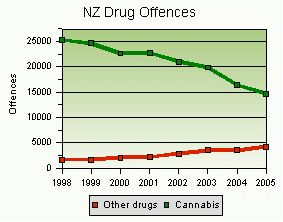Kiwis like cannabis
- We have one of the highest rates of use in the world: 52% of New Zealanders aged 15 – 45 admit to having used cannabis at some time, and 16% describe themselves as current users.
- Use rose more than 20% from 1990 to 1998, a period of tougher laws and increased arrests.
- The 2012 United Nations 2012 Drug Report confirmed we are still among the top pot users in the world.
- There are too many cannabis consumers to arrest: over half a million Kiwis regularly break the law on cannabis, including 70,000 on a daily basis!
Our cannabis laws are very harsh
- NZ Police arrest more people for cannabis, per head of population, than any other country in the world.

- NZ Police spent 598,000 hours enforcing the War on Drugs in 2006, at a estimated cost of over $100 million, according to the Law Commission’s 2011 review of the Misuse of Drug Act. Their report found “Responding to the possession and use of drugs occupies a significant amount of police and court time and attention. Personal possession and use offences comprised 69 per cent of the approximately 25,000 drug offences recorded by the Police in 2009.”
- More money is spent on enforcing prohibition than on drug education and treatment. There is no funding for educating adults on safer drug use.
- The 1998 Drugs In New Zealand Survey found that of the four per cent of cannabis users who wanted to seek help for their cannabis use but did not, fear of the law was the main reason given.
- In 1998, 1,794 school children were suspended for drug use – fifteen per cent of all suspensions.
- Even after adjusting for use rates, Maori are arrested, prosecuted, and imprisoned at higher rates than non-Maori.
There is a lot of misinformation about cannabis
- Cannabis use does not cause mental illness, but can have a detrimental effect on some people with pre-existing mental illnesses.
- The average potency of cannabis has not increased. The level of THC in New Zealand cannabis is considered average by international standards.
- The great majority of people who try cannabis do not go on to become regular users or go on to hard drugs.
- Drug-related deaths in New Zealand are around 90% from tobacco use, 10% from alcohol, with less than 1% from illicit and prescription drugs.
Reforming drug laws will not lead to increased use
- Ending cannabis prohibition in the Netherlands, Australia and 17 US states has not led to increases in cannabis use. There is no difference in use rates between states that enforce prohibition and those which have decriminalised or legalised cannabis.
- Only 23% of Dutch people aged 15 to 64 had ever tried marijuana and 7% had used it recently, compared to 52% and 24% in the US, and 50% lifetime use and 15% recent use in New Zealand.
- Research comparing US states that have legalised medical use even found lower rates of teenage use, road accidents and suicide.
Advocates of prohibition should demonstrate why their failed policy should remain
- Since drug laws have little bearing on drug use rates, it begs the question of why persist with counterproductive and costly prohibition laws?
- The 1998 Health Select Committee Inquiry into the Mental Health Effects of Cannabis unanimously recommended “the Government review the appropriateness of existing policy on cannabis and its use and reconsider the legal status of cannabis”.
- The 2003 Health Select Committee Inquiry into the public health strategies related to cannabis use and the most appropriate legal status failed to make a recommendation on the legal status, instead imploring “that the Justice and Electoral Committee consider an appropriate legal status for cannabis”.
- This was not done. Instead, the Law Commission reviewed the entire Misuse of Drugs Act and released a report in 2011. Among the many recommendations were a cautioning scheme for minor cannabis offences, allowing medicinal use, decriminalising harm reducing utensils, and greater tolerance of social supply.
- The Government is yet to formally respond to the Law Commission’s recommendations.
